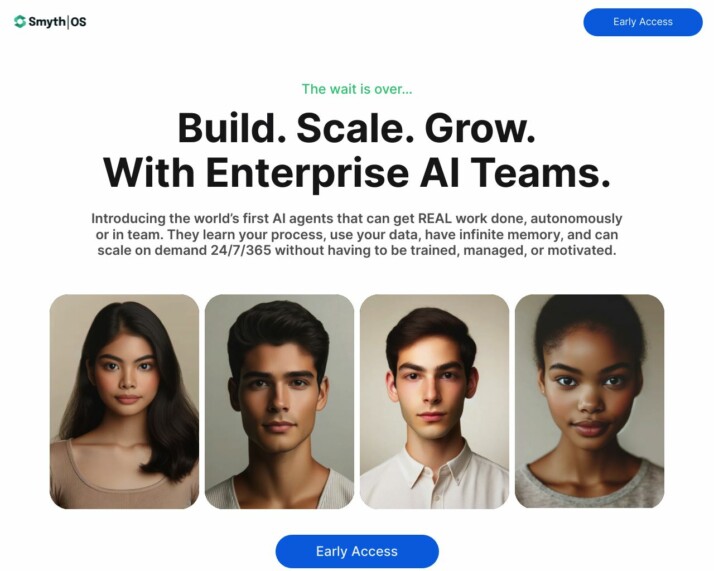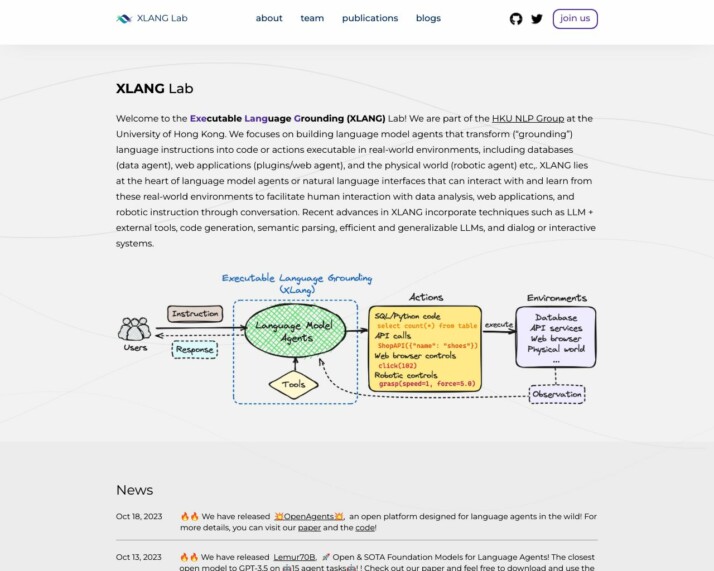Introduction
In the world of Artificial Intelligence, the race for the most efficient, user-friendly, and technologically advanced platform is on. Two notable competitors in this race are SmythOS vs OpenAgents. This article embarks on a comprehensive comparison between these two platforms, uncovering insights about their features, services, target audience, and additional offerings. Our aim is to equip the reader with a detailed understanding that could guide informed decision-making, be it for personal use, business applications, or simply broadening one’s knowledge about the advancing AI technology landscape.
An Overview of SmythOS and its Unique Capabilities

SmythOS is a leading platform designed for building and deploying AI agents. This adaptable system features a drag-and-drop visual builder, a no-code editor, and advanced AI integration capabilities. It’s specifically built to enhance the functionality and accessibility of AI technologies across various sectors.
- Large Language Models (LLMs): LLM stands for Large Language Models which SmythOS brilliantly implements in their system offering.
- Scalability: SmythOS operates on a SaaS usage-based model, ensuring cost-effectiveness and efficient resource allocation, catering to the growing demands of enterprises and agencies.
- Flexibility: SmythOS supports various deployment options such as chatbots, apps, and API endpoints, offering excellent flexibility.
The unique features of SmythOS such as the use of data lake components and API integration and deployment stand out among the competition, enhancing the vision of the platform towards making AI development and deployment more efficient and accessible.
The target audience for SmythOS is quite broad, catering to large-scale organizations, businesses, developers, AI engineers, R&D teams, customer service departments, and IT and system administrators. Its versatile features and applications cater to different needs, providing a comprehensive solution for both technical experts and business users.
An Overview of OpenAgents and its Offering


OpenAgents is a forward-thinking platform that creates language agents for everyone. It’s perfect for both experts and non-experts, making Artificial Intelligence (AI) and language agents simpler to use in our daily life.
OpenAgents offers three free agents for use – Data Agent, Plugins Agent, and Web Agent. Each of these agents has its own special use. The Data Agent can handle big datasets and change them into insights for folks like marketing professionals. The Plugins Agent has over 200 plugins and can do a variety of tasks, from checking the weather to online shopping. Finally, the Web Agent can explore the internet for you, making it easy to find information or resources online.
The vision of OpenAgents is to make AI and language agents usable and handy for everyone, every day. Remember, there’s no one-size-fits-all answer to your questions – OpenAgents is all about offering real-life help for real-life problems.
In terms of OpenAgents features, they’ve got a user-friendly web interface that helps everyone talk to the agents easily. There’s also the cool autonomous operation of the AI agents – they can work by themselves! And let’s not forget the memory and context skills of these agents – they remember what occurred before and can figure out what might happen next.
OpenAgents target market is wide and varied. It includes general users, people who want a better web browsing experience, developers and tech enthusiasts, and even non-expert users who just want simpler AI interaction.
Finally, on the OpenAgents roadmap, they already shipped a platform focused on the three agents. The agents come with a backend code, a frontend user interface, and a Chrome extension (for the Web Agent). The platform can also be customized with new agents and plugins, making it adaptable for different needs.
SmythOS vs OpenAgents: A Battle of Features
In the constantly evolving world of technology, SmythOS and OpenAgents have emerged as two noteworthy platforms. This piece offers an in-depth SEO-optimized look at crucial features for prospective users making a decision between SmythOS and OpenAgents.
| Features | SmythOS | OpenAgents |
|---|---|---|
| Hosted Agents (Dev, Production) | ✅ | ✅ |
| Visual Builder | ✅ | ❌ |
| No-Code | ✅ | ❌ |
| Memory & Context | ✅ | ✅ |
| Autonomous Agents | ✅ | ✅ |
| Debug Tools | ✅ | ✅ |
| Multimodal | ✅ | ❌ |
| Work in Team | ✅ | ❌ |
| API Auth (OAuth + Key) | ✅ | ✅ |
| PDF Support | ✅ | ❌ |
Our comparison table showcases important differences between SmythOS and OpenAgents. A significant differentiation appears in the ‘Visual Builder’ and ‘No-Code’ areas, where SmythOS holds an advantage. These features simplify the user experience, making SmythOS an ideal platform even for beginners in the tech space. Another valuable feature is ‘PDF Support’, available in SmythOS but absent in OpenAgents, which eases file access and portability.
On the other hand, both platforms demonstrate strong ties in areas like ‘Hosted Agents (Dev, Production)’, ‘Memory & Context’, ‘Autonomous Agents’ and ‘API Auth (OAuth + Key)’. It is these similarities which underline the potential of both platforms, whilst their differences position them for varied user needs.
To explore the features in greater detail, you may visit the official websites of SmythOS and OpenAgents.
Target Audiences: Identifying End Users for SmythOS and OpenAgents
This section will delve into the intended audience for both SmythOS and OpenAgents, identifying the end users and how the features and applications cater to their needs.
SmythOS Users:
- Enterprises and Businesses: Large-scale organizations and businesses that require scalable AI solutions for processing large volumes of data, automating tasks, and enhancing customer interactions. The datalake component, API integration, and scalability features are particularly beneficial for these entities.
- Developers and AI Engineers: Technical professionals who are looking to build, deploy, and manage AI agents with ease. The integration with foundational models like GPT, drag-and-drop workflow builders, and the ability to deploy AI agents in various formats cater to developers who need a flexible and robust platform for AI development.
- Innovation and R&D Teams: Teams focused on research and development in AI and machine learning can leverage SmythOS for its capability to integrate with advanced AI models and for its inference-focused platform, allowing for rapid prototyping and deployment of AI agents.
- Customer Service and Support Departments: Departments that require AI-driven solutions for customer engagement, such as chatbots and other interactive tools. SmythOS’s ability to deploy AI as interactive chatbots on websites makes it a suitable choice for enhancing customer service.
- IT and System Administrators: Professionals responsible for maintaining and optimizing IT infrastructure can benefit from the platform’s emphasis on scalability and efficient resource allocation, ensuring that AI solutions are cost-effective and align with the organization’s usage patterns.
- Marketing and Web Management Teams: Teams managing websites and online content can utilize SmythOS’s site and URL crawling capabilities for better understanding and interacting with web content, which is crucial for digital marketing and online presence.
OpenAgents Users:
- General Users Seeking Convenience in Daily Tasks: The Plugins Agent, with its vast array of over 200 plugins, caters to everyday users looking to streamline a variety of tasks. This can range from checking the weather to online shopping or accessing specific information. It’s a versatile tool that can significantly enhance the digital experience for the average consumer or hobbyist.
- Users Who Require Enhanced Web Interaction: The Web Agent is tailored for users who want a more automated and efficient web browsing experience. This includes individuals who often research online or those who wish to automate repetitive web-based tasks. The Chrome extension feature of this agent suggests a focus on users who are comfortable with browser extensions and are looking for more efficient ways to navigate and extract information from the web.
- Developers and Tech Enthusiasts: Given its open-source nature and the possibility to deploy on localhost, OpenAgents also appeals to developers and tech enthusiasts. These users can customize the platform, extend new agents, and integrate additional functionalities as per their requirements. This aspect of OpenAgents caters to a more technically inclined audience who are interested in tailoring AI agents to specific needs or experimenting with AI capabilities.
- Non-Expert Users Seeking Simplified AI Interaction: The platform’s design emphasizes accessibility for non-expert users, making it suitable for individuals who are not necessarily tech-savvy but are interested in leveraging AI for personal or professional use. The user-friendly interface and the web UI allow for easy communication with the agents, thus broadening its appeal to a general audience.
In summary, SmythOS and OpenAgents are designed for diverse audiences, from technical experts in AI to business users in need of AI-driven solutions. Their features cater to a wide range of needs, from development and deployment flexibility to advanced AI capabilities and efficient resource management.
When comparing SmythOS and OpenAgents, SmythOS stands out for its comprehensive and flexible AI integration capabilities, scalable infrastructure, and a broad spectrum of deployment options, all aimed at enhancing the functionality and accessibility of AI technologies in various sectors.
Conclusion
After conducting a thorough feature comparison, it is evident that SmythOS has several advantages and strengths that make it a favorable choice. The platform stands out for its comprehensive and flexible AI integration capabilities, scalable infrastructure, and broad spectrum of deployment options. SmythOS is particularly adaptable, allowing AI agents to be integrated and utilized in various environments and for diverse applications.
One of the standout features of SmythOS is its ability to serve as an operating system for building AI agents. It provides hosting and deployment options such as chatbots, apps, APIs, or plugins. This extensive support for different deployment formats showcases the platform’s versatility and adaptability to different user needs.
The platform’s visual builder, featuring a drag-and-drop interface, enables users to create complex workflows without the need for coding. This no-code editor empowers users with minimal coding experience to construct the cognitive logic of an agent easily. This ease of use caters to a broad audience, including individuals with limited technical expertise.
SmythOS also offers advanced features such as memory and context components, enabling agents to store, retrieve, and update information over time. This capability facilitates experience-based learning, allowing AI agents to continuously adapt and develop their capabilities progressively.
Another key advantage of SmythOS is its focus on explainability and transparency. The platform provides advanced debugging tools and logging capabilities, allowing users to understand the decision-making processes of AI agents. This transparency is crucial in building trust and facilitating compliance with ethical standards.
Integrating with Zapier expands SmythOS’s operational domain across various platforms. Additionally, SmythOS natively integrates with various APIs and supports a wide range of data sources, suggesting compatibility with diverse APIs and RPA tools. The platform includes components like classifiers and logic gates, empowering users with data categorization and complex logic capabilities.
SmythOS caters to a diverse audience, including enterprises and businesses in need of scalable AI solutions. The platform’s data lake components, API integration, and scalability features are particularly beneficial for large-scale organizations processing significant volumes of data and aiming to automate tasks and enhance customer interactions.
Developers and AI engineers can leverage SmythOS for building, deploying, and managing AI agents with ease. The platform’s integration with foundational models like GPT, robust drag-and-drop workflow builders, and the ability to deploy agents in various formats cater to developers in need of a flexible and reliable platform for AI development.
Innovation and R&D teams focused on AI and machine learning research can benefit from SmythOS’s capacity to integrate with advanced models and its inference-focused platform. This allows for rapid prototyping and deployment of AI agents, facilitating experimentation and exploration of cutting-edge approaches.
Customer service and support departments can utilize SmythOS for AI-driven solutions such as chatbots and interactive tools. The platform’s ability to deploy AI as interactive chatbots on websites makes it a suitable choice for enhancing customer service and engagement.
IT and system administrators responsible for maintaining and optimizing IT infrastructure can benefit from SmythOS’s scalability and efficient resource allocation. The platform’s emphasis on scalability ensures cost-effectiveness and alignment with an organization’s usage patterns, making it a valuable asset for IT professionals.
Marketing and web management teams can leverage SmythOS’s site and URL crawling capabilities to better understand and interact with web content. This is crucial for digital marketing and enhancing online presence.
SmythOS is designed to cater to a wide range of users and industries, from technical experts in AI to business users in need of AI-driven solutions. Its features cater to a diverse set of needs, including development and deployment flexibility, advanced AI capabilities, and efficient resource management. With its vision of making AI development and deployment more efficient, accessible, and highly functional, SmythOS offers a sophisticated platform for creating and deploying AI agents with a range of capabilities.
Last updated:
Disclaimer: The information presented in this article is for general informational purposes only and is provided as is. While we strive to keep the content up-to-date and accurate, we make no representations or warranties of any kind, express or implied, about the completeness, accuracy, reliability, suitability, or availability of the information contained in this article.
Any reliance you place on such information is strictly at your own risk. We reserve the right to make additions, deletions, or modifications to the contents of this article at any time without prior notice.
In no event will we be liable for any loss or damage including without limitation, indirect or consequential loss or damage, or any loss or damage whatsoever arising from loss of data, profits, or any other loss not specified herein arising out of, or in connection with, the use of this article.
Despite our best efforts, this article may contain oversights, errors, or omissions. If you notice any inaccuracies or have concerns about the content, please report them through our content feedback form. Your input helps us maintain the quality and reliability of our information.
Alexander De Ridder
Co-Founder, Visionary, and CTO at SmythOS. Alexander crafts AI tools and solutions for enterprises and the web. He is a smart creative, a builder of amazing things. He loves to study “how” and “why” humans and AI make decisions.
Explore All Comparison Articles
Decisions vs. Sola: AI Workflow Automation Showdown
AI-powered workflow automation platforms revolutionize how businesses streamline operations and boost productivity. This comparison explores Decisions vs. Sola, and SmythOS,…
DeepOpinion vs. Sola: Comparing AI Automation Platforms
AI-powered automation platforms revolutionize business operations, but choosing the right solution can be challenging. This comparison of DeepOpinion vs. Sola,…
DevGPT vs. Sola: AI-Powered Development Tools Compared
AI-powered development tools revolutionize software creation, offering unprecedented efficiency and capabilities. This comprehensive review compares DevGPT vs. Sola, and SmythOS,…
Fine AI vs. Sola: Comparing AI Automation Tools
AI-powered automation transforms software development and business workflows, offering unprecedented efficiency and innovation. Fine AI vs. Sola present distinct approaches…
FlowiseAI vs. Sola: Comparing AI Automation Platforms
AI-powered automation revolutionizes business operations, driving efficiency and innovation across industries. FlowiseAI vs. Sola offer distinct approaches to harness this…
Gooey AI vs. Sola: AI-Powered Automation Platforms Compared
AI-powered automation platforms revolutionize how businesses streamline operations and enhance productivity. This comparison delves into Gooey AI vs. Sola, two…

